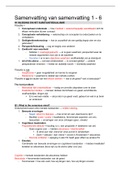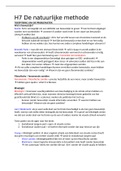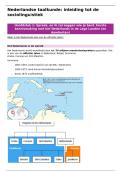Summary: A Practical Guide to Dutch Building Contracts
Legal & Governance Aspects (2020 – 2021)
A Practical Guide to Dutch Building Contracts
Chao-Duivis, M. A. B., Bruggeman, E. M., Koning, A. Z. R., Ubink, A. M. (2018). A Practical Guide to Dutch Building Contracts (4th edition). ’s-
Gravenhage, the Netherlands: Instituut voor Bouwrecht.
Chapter 1: The law of contract and obligations in general
The definition of ‘contract’ in the Dutch Civil Code (CC), Article 6:213, reads as follows: an agreement
in the meaning of this Title is a multilateral juridical act whereby one or more parties enter into an
obligation towards one or more other parties (page 11).
Parties are in principle free to enter into any agreement they wish with anyone they wish, irrespective
whether or not the law lays down rules regarding such an agreement (page 12).
The requirements for a contract that is legally valid are (page 17):
- Consensus
- Compliance with the prescribed form (if any)
- No incompatibility with the law, public moral and/or public order
- No vitiated consent
- No fraudulency in respect of creditors
The law contains mainly regulatory provisions, i.e. provisions that can be waived. In practice General
Terms and Conditions (GTC) are therefore used. These are sets of conditions laying down arrangements
that recur in almost every contract, thus saving the parties a lot of time (page 21).
In the GTC the parties are referred to as the user and the contracting party. The user is the person
using the GTC in an agreement: in the construction industry this will usually be the contractor, architect
or building engineer. The contracting party is the person accepting the validity of the GTC by signing a
document or in some other way. In the construction industry this is often the client (page 22).
A creditor is entitled to fulfilment, that is what it is all about for him. But what if the debtor does not
comply? The creditor then has various rights at his disposal, an overview is given (page 29-36):
- Failure
- Default
- Notice of default
- Rescission
- Unforeseen circumstances
Books seven and eight of the Civil Code lay down statutory rules on various specified agreements,
referred to as ‘special agreements’. These are agreements that occur frequently in practice and in
relation to which the lawmakers consider it useful to assist contracting parties in practice (page 36).
The following special agreements play a role in construction law:
- Purchase agreements
- Contracts for works
- Commission contracts
It is customary in construction law to distinguish between various contract models. They differ mainly
in the degree of influence that the client has and the resulting liability. The models are (page 37):
- The traditional model
- The model of early contractor involvement
- The integrated model
- The alliance model
In the alliance model the client is in fact more involved in design and execution. The client and
contractor enter into a partnership, with the effect that they treat one another as equals. In addition,
there are the project management contracts and public-private partnership (page 38).
Page 1 of 7
, Summary: A Practical Guide to Dutch Building Contracts
Legal & Governance Aspects (2020 – 2021)
Chapter 2: The Contract with a Consultant (The New Rules 2011)
In a traditional building process, the client uses an architect and possibly other consultant to draw up
a design for a building. This contract is usually governed by general terms and conditions, nowadays
The New Rules 2011 (page 41).
The New Rules 2011 are standard general terms and conditions for commission to consultants and is
applicable to all client-consultant commissions. The successor of The New Rules 2011 is the SR 1977
and RVOI 2001 (page 43).
The New Rules are standardised general terms and conditions for the client-consultant relationship.
When The New Rules are applied, the entire client-consultant legal relationship is based on (page 44):
- A basic contract out the specific agreements for the commission
- The New Rules 2011: the general terms and conditions that lay down general rules for the
contractual relationship with a consultant
- DNR-STB 2009: the consultant’s remit in indicated by ticking the duties set out in this standard
description.
The consultant and client both have obligations, the obligations are listed in the table (page 45 & 48).
Client’s obligations Consultant’s obligations
To act as a good and carful client To possess required knowledge and skills
To handle the consultant’s data confidentially To handle the client’s data confidentially
To furnish information and data in time To act as a good and carful contractor
To vouch for the correctness of information and To act in a position of trust vis-à-vis the client
data furnished
To take decision in time To provide independent advice
To vouch for the correctness of decisions taken To take out compulsory insurance
To identify the consultant against claims by Not to start on the next stage without the
third parties in respect of information and data client’s consent
from, and decisions by, the client
To assess documents produced by the To provide duplicates of stored data for a
consultant in time consideration
To warn of incorrect advice To comply with the schedule
To appoint a representative To hand over documents to the client
No to employ staff of the consultant on To appoint an authorised representative
secondment
Not to transfer the commission without the To take relevant rules into account
consultant’s consent
To pay the fee on time To warn
To store data
To inform
The New Rules 2011 lay down two types of limitations of liability, these types are (1) limitations on the
types of damage that are eligible for compensation, and (2) a ceiling on the amount of damage eligible
for compensation (page 51).
The New Rules 2011 lay down that the consultant’s liability cannot exceed one or three times the
consultancy costs payable to him, with a maximum 0f 1.000.000 or 2.500.00 euros respectively if the
consultancy costs exceed this amount (Article 15 DNR 2011). The parties must choose whether to limit
the consultant’s liability to one or three times his consultancy costs in their contract. There are
different rules for consumers. If a consumer suffers damage in the case of a contract with consultancy
Page 2 of 7
Legal & Governance Aspects (2020 – 2021)
A Practical Guide to Dutch Building Contracts
Chao-Duivis, M. A. B., Bruggeman, E. M., Koning, A. Z. R., Ubink, A. M. (2018). A Practical Guide to Dutch Building Contracts (4th edition). ’s-
Gravenhage, the Netherlands: Instituut voor Bouwrecht.
Chapter 1: The law of contract and obligations in general
The definition of ‘contract’ in the Dutch Civil Code (CC), Article 6:213, reads as follows: an agreement
in the meaning of this Title is a multilateral juridical act whereby one or more parties enter into an
obligation towards one or more other parties (page 11).
Parties are in principle free to enter into any agreement they wish with anyone they wish, irrespective
whether or not the law lays down rules regarding such an agreement (page 12).
The requirements for a contract that is legally valid are (page 17):
- Consensus
- Compliance with the prescribed form (if any)
- No incompatibility with the law, public moral and/or public order
- No vitiated consent
- No fraudulency in respect of creditors
The law contains mainly regulatory provisions, i.e. provisions that can be waived. In practice General
Terms and Conditions (GTC) are therefore used. These are sets of conditions laying down arrangements
that recur in almost every contract, thus saving the parties a lot of time (page 21).
In the GTC the parties are referred to as the user and the contracting party. The user is the person
using the GTC in an agreement: in the construction industry this will usually be the contractor, architect
or building engineer. The contracting party is the person accepting the validity of the GTC by signing a
document or in some other way. In the construction industry this is often the client (page 22).
A creditor is entitled to fulfilment, that is what it is all about for him. But what if the debtor does not
comply? The creditor then has various rights at his disposal, an overview is given (page 29-36):
- Failure
- Default
- Notice of default
- Rescission
- Unforeseen circumstances
Books seven and eight of the Civil Code lay down statutory rules on various specified agreements,
referred to as ‘special agreements’. These are agreements that occur frequently in practice and in
relation to which the lawmakers consider it useful to assist contracting parties in practice (page 36).
The following special agreements play a role in construction law:
- Purchase agreements
- Contracts for works
- Commission contracts
It is customary in construction law to distinguish between various contract models. They differ mainly
in the degree of influence that the client has and the resulting liability. The models are (page 37):
- The traditional model
- The model of early contractor involvement
- The integrated model
- The alliance model
In the alliance model the client is in fact more involved in design and execution. The client and
contractor enter into a partnership, with the effect that they treat one another as equals. In addition,
there are the project management contracts and public-private partnership (page 38).
Page 1 of 7
, Summary: A Practical Guide to Dutch Building Contracts
Legal & Governance Aspects (2020 – 2021)
Chapter 2: The Contract with a Consultant (The New Rules 2011)
In a traditional building process, the client uses an architect and possibly other consultant to draw up
a design for a building. This contract is usually governed by general terms and conditions, nowadays
The New Rules 2011 (page 41).
The New Rules 2011 are standard general terms and conditions for commission to consultants and is
applicable to all client-consultant commissions. The successor of The New Rules 2011 is the SR 1977
and RVOI 2001 (page 43).
The New Rules are standardised general terms and conditions for the client-consultant relationship.
When The New Rules are applied, the entire client-consultant legal relationship is based on (page 44):
- A basic contract out the specific agreements for the commission
- The New Rules 2011: the general terms and conditions that lay down general rules for the
contractual relationship with a consultant
- DNR-STB 2009: the consultant’s remit in indicated by ticking the duties set out in this standard
description.
The consultant and client both have obligations, the obligations are listed in the table (page 45 & 48).
Client’s obligations Consultant’s obligations
To act as a good and carful client To possess required knowledge and skills
To handle the consultant’s data confidentially To handle the client’s data confidentially
To furnish information and data in time To act as a good and carful contractor
To vouch for the correctness of information and To act in a position of trust vis-à-vis the client
data furnished
To take decision in time To provide independent advice
To vouch for the correctness of decisions taken To take out compulsory insurance
To identify the consultant against claims by Not to start on the next stage without the
third parties in respect of information and data client’s consent
from, and decisions by, the client
To assess documents produced by the To provide duplicates of stored data for a
consultant in time consideration
To warn of incorrect advice To comply with the schedule
To appoint a representative To hand over documents to the client
No to employ staff of the consultant on To appoint an authorised representative
secondment
Not to transfer the commission without the To take relevant rules into account
consultant’s consent
To pay the fee on time To warn
To store data
To inform
The New Rules 2011 lay down two types of limitations of liability, these types are (1) limitations on the
types of damage that are eligible for compensation, and (2) a ceiling on the amount of damage eligible
for compensation (page 51).
The New Rules 2011 lay down that the consultant’s liability cannot exceed one or three times the
consultancy costs payable to him, with a maximum 0f 1.000.000 or 2.500.00 euros respectively if the
consultancy costs exceed this amount (Article 15 DNR 2011). The parties must choose whether to limit
the consultant’s liability to one or three times his consultancy costs in their contract. There are
different rules for consumers. If a consumer suffers damage in the case of a contract with consultancy
Page 2 of 7











